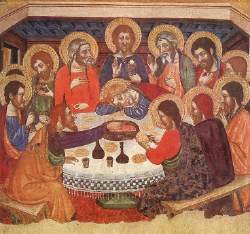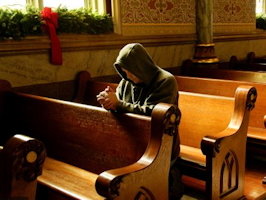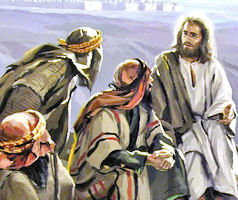» Enjoy our Liturgical Seasons series of e-books!
Entrance Antiphon Cf Ps 98(97):1-2:
O sing a new song to the Lord, for he has worked wonders; in sight of the nations he has shown his deliverance, alleluia.
Gospel Verse, Year C, John 13:34:
I give you a new commandment, says the Lord: love one another as I have loved you.
Love is man's first and constant vocation. Love is the summary of the whole Bible. Love is the secret of the saints, the necessary way to God. It is the means to reveal God's heart to other men. But the beauty of God's love must show itself fresh and new in every Christian; for beauty, to delight and attract, must be fresh as the morning. Every deed of vital love, performed by us in our personality which nature and grace have fashioned, is like the morning of time itself. "God is love" in its mysterious fullness and infinite freshness. Utterly King and Lord, He unites the baptized of every nation in the one Mystical Body of Christ, by the one Holy Spirit, under the one Mother Mary.
The feast of St. Isidore the Farmer in the US, which is ordinarily celebrated today, is superseded by the Sunday liturgy.
May 15 was formerly the commemoration of St. Dymphna, but the current Roman Martyrology now marks her feast as May 30.
Sunday Mass Readings, Year C:
The First Reading is taken from Acts 14:21-27. Last week we heard of St. Paul's experiences at Antioch in Piscidia during his first missionary journey. Their visit had ended on a sour note as Paul and Barnabas were expelled. The reading ended with "the two shook the dust from their feet in protest and went on to Iconium. Their disciples knew only how to be filled with joy and the Holy Spirit." Today we hear of the conclusion of this first missionary journey where Paul and Barnabas retrace their steps back through Antioch in Piscidia on their way back to Antioch in Syria where they had begun their journey.
The Second Reading is from the Book of Revelation 21:1-5a. For the past three weeks we have had as our second reading an account of John's privileged vision of the heavenly liturgy where he has seen the eternal sacrifice being offered to God the Father by His Son, The New and Eternal High priest and sacrifice. We have heard also the prayers being offered by the faithful. We now go to the end of John's account as he describes the Heavenly Jerusalem. It was Jesus' mission to go to the earthly Jerusalem to offer His sacrifice — this shows us the path that we must follow to reach the Heavenly Jerusalem so that we can dwell with Him there forever.
 The Gospel is from John 13:31-33a, 34-35.We are disciples, followers of Christ, but how many of us would pass the test that Christ himself lays down for deciding who are his true followers? The word "charity" unfortunately has come to have a very restricted meaning in our present-day vocabulary. It signifies giving an alms, a gift of money to a needy person. This is but a very small part of the true charity, true love of neighbor which Christ made the distinguishing mark of the true Christian. He who truly loves his neighbor must be interested, first and foremost, in those things which concern that neighbor's most important purpose in life, his eternal salvation.
The Gospel is from John 13:31-33a, 34-35.We are disciples, followers of Christ, but how many of us would pass the test that Christ himself lays down for deciding who are his true followers? The word "charity" unfortunately has come to have a very restricted meaning in our present-day vocabulary. It signifies giving an alms, a gift of money to a needy person. This is but a very small part of the true charity, true love of neighbor which Christ made the distinguishing mark of the true Christian. He who truly loves his neighbor must be interested, first and foremost, in those things which concern that neighbor's most important purpose in life, his eternal salvation.
Here is where so many good Christians fail in true charity. Effective interest in missionary activity is a case in point. Practical help in parochial matters, taking part in the various societies which are intended to build up and strengthen the faith and the devotion of the members of the parish is another obligation of true charity. So many seem to think it is no concern of theirs but it is. Advising and encouraging, with true Christian kindness, a neighbor who is beginning to grow lax in his attendance to his Christian duties, or who is forming habits or alliances which, if unchecked, will bring misery and suffering to his family, and scandal to the neighborhood, and even the possibility of his own eternal destruction, is also an exercise of real Christian charity.
There are thousands of broken homes today which would not be broken if there was true charity in those homes not only in the heart of the offender but in the hearts of the offended. There are thousands in jails and in hospitals of rehabilitation today who would not be there if their families and neighbors fulfilled their obligation of Christian charity. There are many, far too many, lapsed Catholics in the world today, who would not have lapsed had true charity been practised by their relatives and neighbors. And, last but not least, there are millions of people who have remained outside the Church of Christ because the hall-mark of charity which Christ said was its distinguishing mark was tarnished or invisible. Each one of us could, with great profit, spend a few moments today looking into ourselves and comparing our thoughts and our words and our actions with the thoughts, words and actions of love which Christ expects from his followers.
It is never too late to mend. Begin today to take a true Christian interest in the spiritual fate of your family and neighbors. Where words have already failed perhaps, try prayer and example. The grace of God will cooperate with your sincere, charitable effort.
—Excepted from The Sunday Readings, Fr. Kevin O'Sullivan, O.F.M.
Meditation: Christian Spirituality
 The glorification of Christ was not completed by His resurrection from the dead. He goes to the Father also as man, that He may take possession of His throne and, as the glorified Savior, share with God dominion over the world. "Sing ye to the Lord a new canticle" (Introit). He withdraws His visible presence from His disciples and from His Church that He may send them the Holy Spirit in His place. But by means of the Holy Spirit, He will always remain with them invisibly and spiritually. "If I go not, the Paraclete will not come to you; but if I go, I will send Him to you" (Gospel).
The glorification of Christ was not completed by His resurrection from the dead. He goes to the Father also as man, that He may take possession of His throne and, as the glorified Savior, share with God dominion over the world. "Sing ye to the Lord a new canticle" (Introit). He withdraws His visible presence from His disciples and from His Church that He may send them the Holy Spirit in His place. But by means of the Holy Spirit, He will always remain with them invisibly and spiritually. "If I go not, the Paraclete will not come to you; but if I go, I will send Him to you" (Gospel).
"I go to Him that sent Me" (Gospel). Jesus withdraws His visible presence from His disciples and from His Church. They must free themselves from their attachment to His human form; they must give up the comfort and the solace of having Him physically near them and associating with Him. They, too, must become spiritualized. Then only can He send them His Holy Spirit and make them bearers of the Spirit. They must acquire the strength of the Spirit if they are to become the rulers of the world and comfort mankind in all its trials and difficulties. "I go to Him that sent me." This is a call to become more spiritual, to become detached from all that is worldly.
In our piety we all too often act in a manner that is not spiritual, even with our Lord. We long for His sensible presence, for sensible devotion. We wish to have Him speak to us audibly and give us real visions or some tangible manifestation of His love; we long for sensible graces and consolations of many sorts. This is an unsound sort of spirituality, based on sensible devotion. But Christ tells us, "It is expedient to you that I go." We must become more spiritual: that is the lesson taught by the liturgy during the time before Pentecost. We are taught that we must lift up our hearts to the glorified, heavenly Christ, and free ourselves from all that is perceptible to the senses, and live for the life above. We must seek a spirituality based on the spirit of faith and on a determined effort to overcome all our selfish desires and tendencies. Our spirituality must be based on a love that attends to God alone and occupies itself entirely with what comes from Him and leads to Him. "It is expedient to you that I go; for if I go not, the Paraclete will not come to you."
"I will send Him to you." Jesus leaves us; but since He is no longer bodily present, He sends us His Holy Spirit. He merited for us this greatest of all God's gifts, the Holy Spirit, through His suffering and death. Now He ascends into heaven that He may send Him to us as our comforter to take His place. But the Holy Spirit has not come to protect us from all suffering and adversity, from temptation and difficulties. He comes rather to fill us with the strength to live and work for Jesus under all circumstances; that is, to work in the spirit of truth and humility. He comes to help us live in voluntary poverty, humility, and suffering. In a word, the Holy Spirit comes to help us conform our lives perfectly to the life of Christ. The Holy Spirit induces us to live in Jesus and for Jesus. He makes us witnesses (martyrs) and this spirit we gladly embrace ridicule, injustice, suffering, the loss of our possessions, and even the loss of our life. How much we stand in need of such a helper and comforter! How fervently we should pray during this week that God may send this blessed comforter to us and to His Church!
With the newly baptized we perceive the sensible presence of the Lord in the great festivities and symbols of Easter day. Now the liturgy seeks to lead us from the joy of Easter back to the struggle and the sufferings of the world. She seeks to anchor our hearts in heaven, to elevate them above attachment to the world and the love of mere temporal things. She seeks to lift our hearts to heaven, "where true joys are to be found" (Collect). For us who are Christians, a higher world, a world of eternity, is the one reality. To help us reach that world, the glorified Lord sends us the Holy Spirit. We long for His coming and cry without ceasing: Veni, Sancte Spiritus: "Come, Holy Spirit, and fill the hearts of Thy faithful."
The most effective means of acquiring true Christian spirituality is through participation in the Mass. We must renounce our personal, human, egotistical spirit, and rid ourselves of all that is worldly and transient. For this reason we receive the Holy Eucharist, which is the spiritualized and glorified flesh and blood of the Lord, who pours forth the wealth and the riches of the Holy Spirit upon us.
—Benedict Bauer, O.S.B, from The Light of the World, Vol II, Fourth Sunday after Easter
Meditation for the Fifth Sunday of Easter: Christian Spirituality
 The glorification of Christ was not completed by His resurrection from the dead. He goes to the Father also as man, that He may take possession of His throne and, as the glorified Savior, share with God dominion over the world. "Sing ye to the Lord a new canticle" (Introit). He withdraws His visible presence from His disciples and from His Church that He may send them the Holy Spirit in His place. But by means of the Holy Spirit, He will always remain with them invisibly and spiritually. "If I go not, the Paraclete will not come to you; but if I go, I will send Him to you" (Gospel).
The glorification of Christ was not completed by His resurrection from the dead. He goes to the Father also as man, that He may take possession of His throne and, as the glorified Savior, share with God dominion over the world. "Sing ye to the Lord a new canticle" (Introit). He withdraws His visible presence from His disciples and from His Church that He may send them the Holy Spirit in His place. But by means of the Holy Spirit, He will always remain with them invisibly and spiritually. "If I go not, the Paraclete will not come to you; but if I go, I will send Him to you" (Gospel).
"I go to Him that sent Me" (Gospel). Jesus withdraws His visible presence from His disciples and from His Church. They must free themselves from their attachment to His human form; they must give up the comfort and the solace of having Him physically near them and associating with Him. They, too, must become spiritualized. Then only can He send them His Holy Spirit and make them bearers of the Spirit. They must acquire the strength of the Spirit if they are to become the rulers of the world and comfort mankind in all its trials and difficulties. "I go to Him that sent me." This is a call to become more spiritual, to become detached from all that is worldly.
In our piety we all too often act in a manner that is not spiritual, even with our Lord. We long for His sensible presence, for sensible devotion. We wish to have Him speak to us audibly and give us real visions or some tangible manifestation of His love; we long for sensible graces and consolations of many sorts. This is an unsound sort of spirituality, based on sensible devotion. But Christ tells us, "It is expedient to you that I go." We must become more spiritual: that is the lesson taught by the liturgy during the time before Pentecost. We are taught that we must lift up our hearts to the glorified, heavenly Christ, and free ourselves from all that is perceptible to the senses, and live for the life above. We must seek a spirituality based on the spirit of faith and on a determined effort to overcome all our selfish desires and tendencies. Our spirituality must be based on a love that attends to God alone and occupies itself entirely with what comes from Him and leads to Him. "It is expedient to you that I go; for if I go not, the Paraclete will not come to you."
"I will send Him to you." Jesus leaves us; but since He is no longer bodily present, He sends us His Holy Spirit. He merited for us this greatest of all God's gifts, the Holy Spirit, through His suffering and death. Now He ascends into heaven that He may send Him to us as our comforter to take His place. But the Holy Spirit has not come to protect us from all suffering and adversity, from temptation and difficulties. He comes rather to fill us with the strength to live and work for Jesus under all circumstances; that is, to work in the spirit of truth and humility. He comes to help us live in voluntary poverty, humility, and suffering. In a word, the Holy Spirit comes to help us conform our lives perfectly to the life of Christ. The Holy Spirit induces us to live in Jesus and for Jesus. He makes us witnesses (martyrs) and this spirit we gladly embrace ridicule, injustice, suffering, the loss of our possessions, and even the loss of our life. How much we stand in need of such a helper and comforter! How fervently we should pray during this week that God may send this blessed comforter to us and to His Church!
With the newly baptized we perceive the sensible presence of the Lord in the great festivities and symbols of Easter day. Now the liturgy seeks to lead us from the joy of Easter back to the struggle and the sufferings of the world. She seeks to anchor our hearts in heaven, to elevate them above attachment to the world and the love of mere temporal things. She seeks to lift our hearts to heaven, "where true joys are to be found" (Collect). For us who are Christians, a higher world, a world of eternity, is the one reality. To help us reach that world, the glorified Lord sends us the Holy Spirit. We long for His coming and cry without ceasing: Veni, Sancte Spiritus: "Come, Holy Spirit, and fill the hearts of Thy faithful."
The most effective means of acquiring true Christian spirituality is through participation in the Mass. We must renounce our personal, human, egotistical spirit, and rid ourselves of all that is worldly and transient. For this reason we receive the Holy Eucharist, which is the spiritualized and glorified flesh and blood of the Lord, who pours forth the wealth and the riches of the Holy Spirit upon us.
—Benedict Bauer, O.S.B, from The Light of the World, Vol II, Fourth Sunday after Easter






